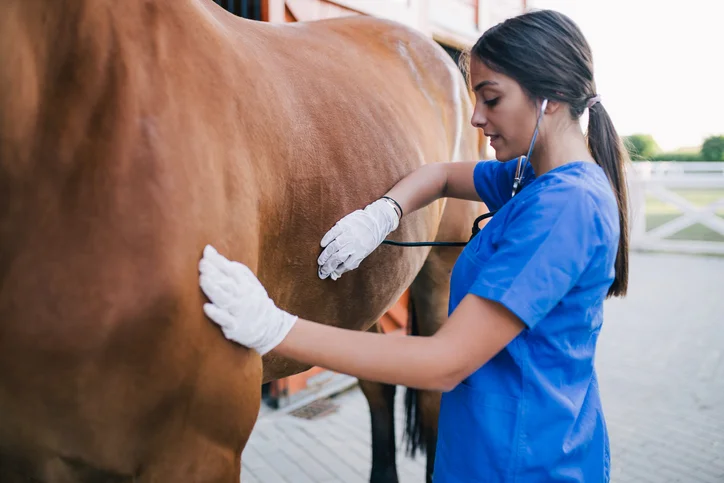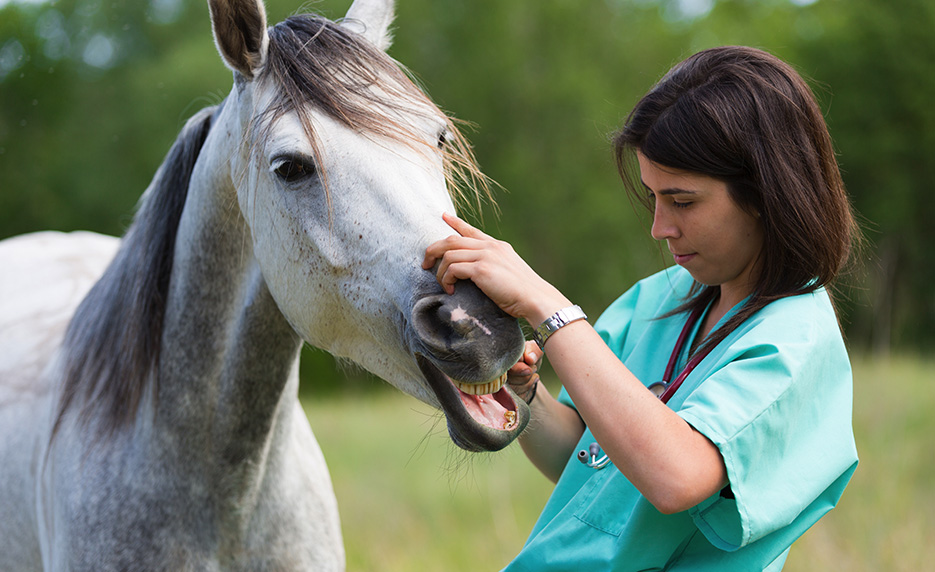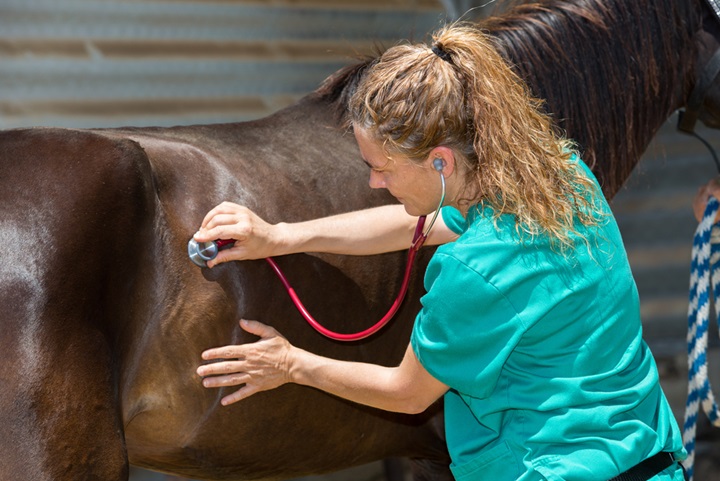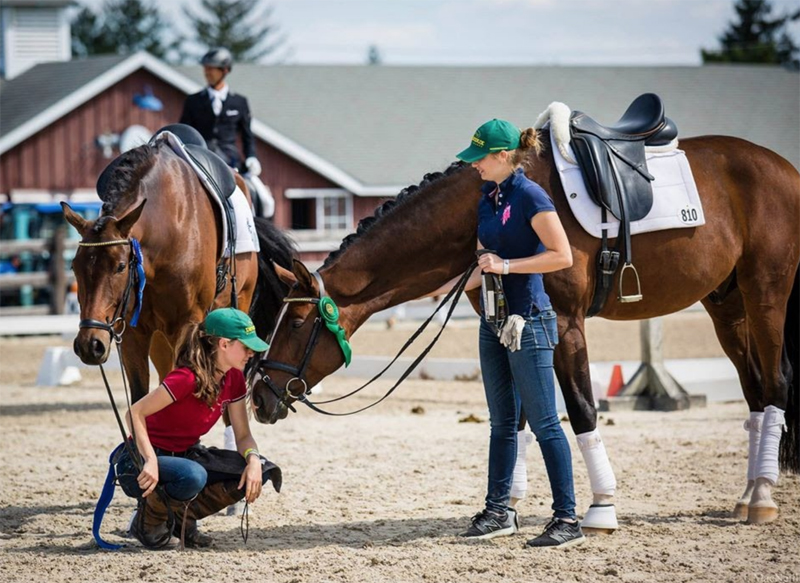Becoming an equestrian vet involves specialized training and a passion for horses. It requires dedication and hard work.
Do you dream of working with horses every day? Becoming an equestrian vet could be the perfect career for you. Equestrian vets are essential in the care and treatment of horses, ensuring their health and well-being. This career path combines a love for animals with medical expertise.
You will need to complete veterinary school and gain experience working with horses. It’s a challenging journey but very rewarding. In this guide, we will explore the steps to become an equestrian vet, from education to hands-on experience. Ready to start your journey? Let’s dive in!

Credit: www.ziprecruiter.com
Introduction To Equestrian Veterinary Medicine
Equestrian veterinary medicine is a specialized field. It focuses on the health and well-being of horses. This rewarding career combines a love for animals with medical expertise. Aspiring equestrian vets must be dedicated and passionate. They play a crucial role in maintaining the health of these majestic creatures.
What Is An Equestrian Vet?
An equestrian vet specializes in horse care. They diagnose and treat a variety of equine health issues. From routine check-ups to emergency surgeries, their work is diverse. They ensure horses remain healthy and fit. This role requires extensive knowledge and hands-on experience.
Importance Of Equestrian Vets
Equestrian vets play a key role in the horse industry. They help maintain the health of sport and recreational horses. Their expertise ensures horses perform at their best. Healthy horses also mean fewer accidents and better safety.
Owners rely on vets to manage their horses’ health. This trust underscores the importance of skilled equestrian vets. Without them, the horse industry would struggle.
Educational Requirements
Becoming an equestrian vet is a rewarding career path. You’ll need dedication, a love for animals, and strong educational qualifications. The journey involves specific educational steps to ensure you are well-prepared for this specialized field.
Pre-veterinary Education
Your journey starts with a bachelor’s degree. Focus on science courses. Biology, chemistry, and physics are essential. Some students major in animal science. Others choose biology or a related field. Volunteer at animal clinics. Gain hands-on experience. Shadow a vet. Learn about the daily tasks of a veterinarian. This early exposure is invaluable.
Veterinary School
After your bachelor’s degree, apply to veterinary school. Veterinary school typically lasts four years. The first two years are classroom-based. You will study subjects like anatomy, physiology, and pharmacology. The last two years focus on clinical training. You’ll work with animals under supervision. This includes horses and other large animals. You must complete internships. Practical experience is crucial. It prepares you for real-world challenges.
After veterinary school, you need to pass a licensing exam. This allows you to practice as a vet. Consider specializing in equine veterinary medicine. Specialized training programs are available. These programs provide advanced knowledge. They help you become an expert in equine care.
Gaining Practical Experience
Aspiring equestrian vets should seek internships at animal clinics. Volunteer at horse stables to gain hands-on experience. Practical skills are crucial for success in this field.
Gaining practical experience is crucial for aspiring equestrian vets. Working directly with horses and other animals helps you build essential skills. This hands-on experience sets you apart in a competitive field. Explore different opportunities to gain this valuable experience.Internships And Externships
Internships and externships are great ways to gain practical experience. They provide real-world learning in a professional setting. Look for internships at veterinary clinics or hospitals. Some equestrian centers also offer internship programs. Externships are shorter but equally beneficial. They allow you to shadow experienced vets. This helps you learn the day-to-day tasks of an equestrian vet. Both internships and externships offer networking opportunities. Building relationships with professionals can help in your career.Volunteering Opportunities
Volunteering is another way to gain practical experience. Many animal shelters need volunteers. They often have horses or other large animals. Volunteering helps you learn basic care and management skills. Look for opportunities at horse rescue organizations. They often need help with daily care tasks. You can also volunteer at local equestrian events. These events need volunteers for various roles. Volunteering shows your commitment and passion for animal care. Gaining practical experience is essential for becoming a skilled equestrian vet. Internships, externships, and volunteering provide valuable hands-on learning. These experiences help you develop the skills needed for a successful career.Licensing And Certification
To become an equestrian vet, you need the right licensing and certification. These ensure you meet the standards required to practice. This process involves passing exams and obtaining specialized certifications. Let’s dive into the details.
State Licensing Exams
Each state requires vets to pass a state licensing exam. These exams test your knowledge and skills. They ensure you are qualified to treat animals.
Here is a table showing common elements of state licensing exams:
| Exam Component | Description |
|---|---|
| Written Exam | Tests theoretical knowledge of veterinary medicine. |
| Practical Exam | Assesses hands-on skills in treating animals. |
| State Laws and Regulations | Ensures understanding of local veterinary laws. |
Passing these exams is crucial. They confirm you meet the standards to practice veterinary medicine.
Specialized Certifications
After getting your state license, consider specialized certifications. These certifications show your expertise in equestrian care.
- Equine Surgery: Focuses on surgical procedures for horses.
- Equine Internal Medicine: Specializes in diagnosing and treating internal conditions.
- Equine Sports Medicine: Deals with athletic injuries and prevention.
These certifications are from recognized veterinary boards. They enhance your skills and credibility.
Skills Needed
Becoming an equestrian vet requires a mix of skills. These skills ensure you can provide the best care for horses. Let’s explore the essential skills needed.
Medical Knowledge
Medical knowledge is crucial for an equestrian vet. You need to understand equine anatomy. You must diagnose and treat various horse illnesses. Knowledge of medications and treatments is essential. Keeping up with advancements in veterinary medicine helps you stay informed. This ensures your patients receive the best care.
Communication Skills
Effective communication skills are vital. You must explain complex medical terms to horse owners. Clear instructions help them follow care plans. Good communication builds trust with clients. It ensures they understand their horse’s needs. Listening to concerns and answering questions is also important.
Physical Stamina
Physical stamina is necessary for this job. Working with horses can be demanding. You may need to lift heavy equipment. Long hours on your feet are common. Being in good physical shape helps you perform your duties. It ensures you can handle the physical demands of the job.

Credit: careertraining.usca.edu
Career Opportunities
Becoming an equestrian vet opens many doors in the veterinary world. These professionals can work in private clinics, research labs, or educational institutions. Each path offers unique experiences and rewards.
Private Practice
Working in a private practice is a popular choice for equestrian vets. They provide medical care directly to horses. This includes regular check-ups, emergency care, and surgeries. Vets in private practice often build close relationships with horse owners. This role demands strong communication and problem-solving skills. It can be very rewarding to see horses recover under your care.
Research Positions
Equestrian vets can also pursue careers in research. They work on developing new treatments and improving animal health. These roles often involve working in laboratories or universities. Research vets contribute to scientific knowledge and can make significant breakthroughs. This career path suits those who are curious and enjoy solving complex problems.
Teaching Roles
Some equestrian vets choose to teach the next generation of vets. They work in veterinary schools and colleges. Teaching roles involve lecturing, supervising practical sessions, and mentoring students. This job is perfect for those who enjoy sharing knowledge and inspiring others. Teaching vets can shape the future of veterinary medicine.
Challenges And Rewards
Becoming an equestrian vet is a unique and rewarding career. It comes with its own set of challenges and rewards. This section delves into both, providing a clear picture of what to expect.
Common Challenges
Working as an equestrian vet presents several challenges. The physical demands of the job can be tough. Vets often work long hours, including nights and weekends.
Another challenge is the emotional toll. Equestrian vets must make difficult decisions, sometimes involving the euthanasia of a beloved horse. This can be heart-wrenching.
Vets also need to stay updated with the latest medical advancements. This requires ongoing education and training, which can be time-consuming and costly.
Dealing with different clients is another challenge. Some may have unrealistic expectations or be uncooperative, adding stress to the job.
Satisfying Aspects
Despite these challenges, being an equestrian vet offers many rewards. One of the most satisfying aspects is saving lives. Helping a horse recover from illness or injury brings immense joy.
Building strong relationships with horses and their owners is another rewarding aspect. Vets often become a trusted part of the horse’s life, forming lasting bonds.
The variety in the job keeps it interesting. Each day brings new cases and different challenges, ensuring that no two days are the same.
Finally, the respect and appreciation from clients can be deeply fulfilling. Knowing that you have made a difference in a horse’s life and brought peace of mind to its owner is incredibly rewarding.
Continuing Education
Becoming an equestrian vet requires ongoing learning. Staying updated with the latest in veterinary medicine is crucial. This helps you provide the best care for horses. Continuing education ensures you remain competitive and knowledgeable.
Staying Updated With Advances
Veterinary medicine evolves quickly. New treatments and technologies appear often. To stay current, read veterinary journals. Attend conferences and seminars. Join online forums and professional groups. This helps you stay informed about new research and advancements.
Professional Development Courses
Take professional development courses regularly. These courses cover various topics. From equine surgery to nutrition. They enhance your skills and knowledge. Many organizations offer these courses. Some are even available online. They fit into your busy schedule easily. Continuing education keeps you on top of your field.
Networking And Professional Organizations
Networking and participating in professional organizations are vital steps in becoming a successful equestrian vet. Engaging with peers and experts can help you stay updated with the latest practices and advancements in veterinary medicine. Here are some ways to build your professional network:
Joining Veterinary Associations
Joining veterinary associations is crucial for anyone aspiring to become an equestrian vet. These associations provide access to valuable resources and information.
- American Veterinary Medical Association (AVMA): Offers educational resources and certifications.
- American Association of Equine Practitioners (AAEP): Focuses on equine medicine and provides networking opportunities.
- State Veterinary Associations: Provide local networking and continuing education.
Membership in these organizations can also offer discounts on conferences, workshops, and publications. This can help you save money while staying informed.
Attending Conferences And Workshops
Attending conferences and workshops is another excellent way to network. These events allow you to meet experts and peers in the field.
You can learn about the latest treatments and technologies, and even participate in hands-on training sessions. Here are some notable events:
- AVMA Convention: Covers a wide range of veterinary topics.
- AAEP Annual Convention: Focused on equine medicine.
- Local Workshops: Often more affordable and convenient.
These events are also a great way to earn continuing education credits, which are required to maintain your veterinary license.
Networking at these events can lead to job opportunities, mentorships, and collaborations. Always bring business cards and be ready to engage in meaningful conversations.

Credit: www.dallasequestriancenter.com
Frequently Asked Questions
What Qualifications Do You Need To Be An Equestrian Vet?
To become an equestrian vet, you need a Doctor of Veterinary Medicine (DVM) degree. Additionally, you must pass the North American Veterinary Licensing Examination (NAVLE). Specializing in equine medicine through internships or residencies is also beneficial.
How Long Does It Take To Become An Equestrian Vet?
Becoming an equestrian vet typically takes about eight years. This includes a four-year undergraduate degree and a four-year veterinary program. Additional internships or residencies may add one to three years.
What Skills Are Essential For Equestrian Vets?
Equestrian vets need strong diagnostic skills, surgical proficiency, and a deep understanding of equine anatomy. Good communication skills with horse owners and handlers are also essential.
How Much Do Equestrian Vets Earn?
Equestrian vets can earn between $70,000 to $150,000 annually. The salary depends on experience, location, and specialization. Those with extensive experience or working in high-demand areas can earn more.
Conclusion
Becoming an equestrian vet is a rewarding journey. Start with a love for horses. Study hard and gain experience. Connect with other vets. Build strong relationships with horse owners. Always keep learning. Your passion and dedication will make a difference.
The path is challenging but worth it. Helping horses live healthier lives is the ultimate reward. Stay committed, stay passionate, and you will succeed.



